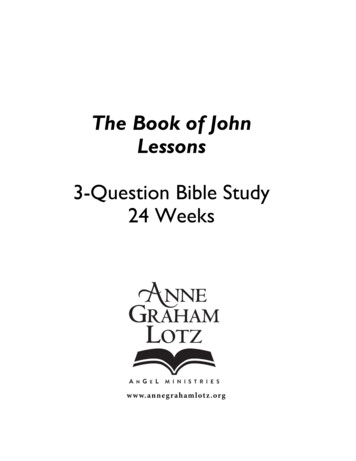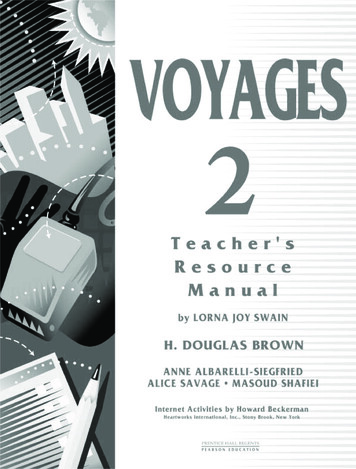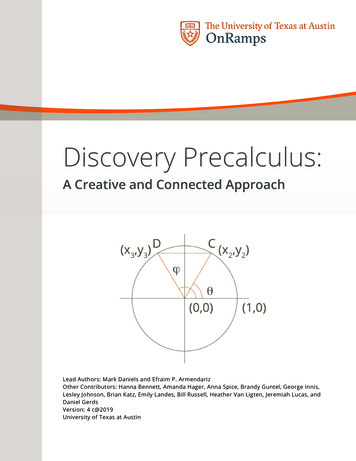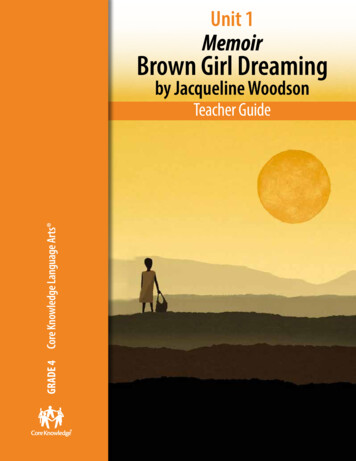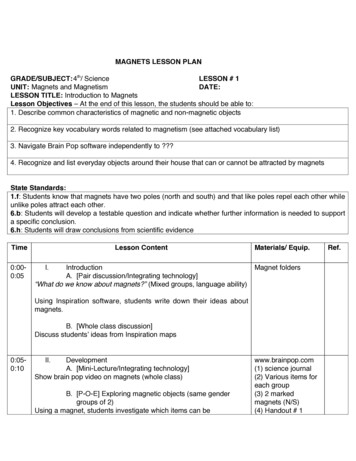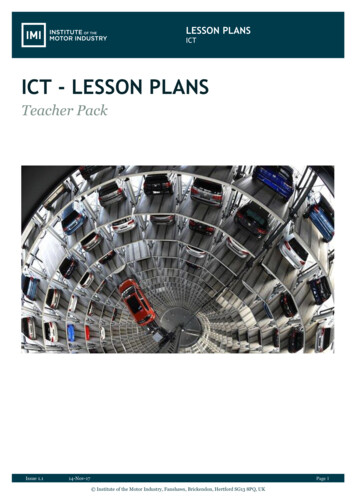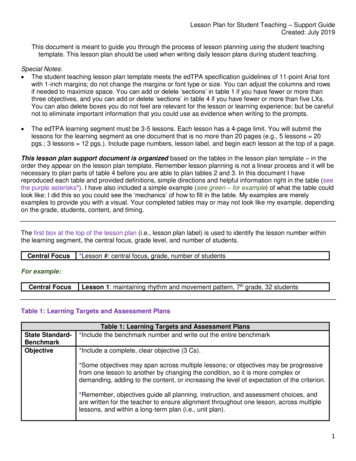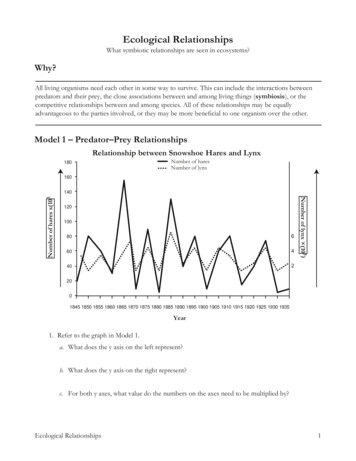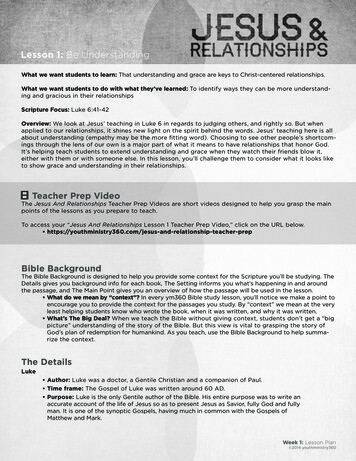
Transcription
Lesson 1: Be UnderstandingJesus&RelationshipsWhat we want students to learn: That understanding and grace are keys to Christ-centered relationships.What we want students to do with what they’ve learned: To identify ways they can be more understanding and gracious in their relationshipsScripture Focus: Luke 6:41-42Overview: We look at Jesus’ teaching in Luke 6 in regards to judging others, and rightly so. But whenapplied to our relationships, it shines new light on the spirit behind the words. Jesus’ teaching here is allabout understanding (empathy may be the more fitting word). Choosing to see other people’s shortcomings through the lens of our own is a major part of what it means to have relationships that honor God.It’s helping teach students to extend understanding and grace when they watch their friends blow it,either with them or with someone else. In this lesson, you’ll challenge them to consider what it looks liketo show grace and understanding in their relationships.Teacher Prep VideoThe Jesus And Relationships Teacher Prep Videos are short videos designed to help you grasp the mainpoints of the lessons as you prepare to teach.To access your “Jesus And Relationships Lesson 1 Teacher Prep Video,” click on the URL below. p-teacher-prepBible BackgroundThe Bible Background is designed to help you provide some context for the Scripture you’ll be studying. TheDetails gives you background info for each book, The Setting informs you what’s happening in and aroundthe passage, and The Main Point gives you an overview of how the passage will be used in the lesson. What do we mean by “context”? In every ym360 Bible study lesson, you’ll notice we make a point toencourage you to provide the context for the passages you study. By “context” we mean at the veryleast helping students know who wrote the book, when it was written, and why it was written. What’s The Big Deal? When we teach the Bible without giving context, students don’t get a “bigpicture” understanding of the story of the Bible. But this view is vital to grasping the story ofGod’s plan of redemption for humankind. As you teach, use the Bible Background to help summarize the context.The DetailsLuke Author: Luke was a doctor, a Gentile Christian and a companion of Paul. Time frame: The Gospel of Luke was written around 60 AD. Purpose: Luke is the only Gentile author of the Bible. His entire purpose was to write anaccurate account of the life of Jesus so as to present Jesus as Savior, fully God and fullyman. It is one of the synoptic Gospels, having much in common with the Gospels ofMatthew and Mark.Week 1: Lesson Plan 2014 youthministry360
Jesus&RelationshipsThe SettingLuke 6:41-42 is in the third major section of the Sermon on the Plain. The purpose of Jesus’ teaching in theSermon on the Plain is to recast the Jewish law in a way that is consistent with the teaching of the Old Testament and yet, also exposes the hearts of His hearers in a fresh way. The audience is primarily His disciples(Luke 6:20), but there is also a great crowd listening to Jesus as well (Luke 6:17).These verses illustrate two major themes of the Sermon on the Plain (and the entire Book of Luke): lovingour enemies and extending mercy to those who don’t seem to deserve it.Is the Sermon on the Plain different from The Sermon on the Mount? The Sermon on the Plain found in Lukehas much of the same content as the Sermon on the Mount found in Matthew. There are two possible explanations. First, Luke and Matthew are recording the same sermon, but are simply describing the geographicalsurroundings differently. Perhaps, Jesus found some sort of plateau on the mountain and Matthew is describing the mountain, while Luke is describing the plateau or plain. The second possibility is that Matthewand Luke are recording two different sermons that share much of the same content, much like hearing apreacher give very similar messages on two different occasions.The Main PointThe Sermon on the Plain is ultimately about reversing the way in which we see the world around us. It’sabout embracing a Kingdom mindset. Jesus is illustrating for His hearers that part of that reversal is radicallychanging the way that we relate to other people. When we experience God’s grace through knowing Jesus,we should be, both, aware of our own sinfulness and willing to extend grace to others. Therefore, in the placeof a judgmental attitude, we have an attitude of understanding. In the place of searching for the faults ofothers, we are gracious to others. Why? Because Jesus is well aware of our sinfulness and would be just incondemning us, yet He extended to us understanding and grace.Lesson PlanThe Lesson Plan contains three elements: An introductory activity called The Lead In; the Bible study sectioncalled The Main Event; an application-focused segment called The Last Word.The Lead In Goal: For students to begin to think about the concept of empathy and how to create empathy. Set-Up: You will need to preview the trailer of the movie “Frozen” (found here http://youtu.be/TbQm5doF Uc ). You will also need to arrange for a way to show this clip to your students.FIRST, ask who has seen the movie Frozen. Ask your students to watch the movie trailer as if they had neverseen the movie. Play the trailer for them.THEN, ask them the following questions: If you had never seen the entire movie, but had only seen this trailer, what are some things youwould conclude about Elsa?o Answer: She seems to be an evil queen who has frozen her entire country. She seems to bethe villain of the movie. OK, now many of you have seen the movie. What is Elsa actually like?o Answer: She is afraid of her powers and doesn’t know how to control them. She is not thevillain, actually the “nice guy,” Hans, turns out to the be villain. What difference does actually knowing Elsa’s story make in how you view her?o Answer: It makes a massive difference. In the trailer it seems like she is an evil ice queen, butin reality she is not. Once we see the movie, we are much more empathetic to Elsa.Week 1: Lesson Plan 2014 youthministry360
Jesus&Relationships Do you think we make judgments about people we know without understanding the entire story?Can you give some examples.o Answer: Yes! Probably all the time. The examples will vary.FINALLY, conclude by observing that we can make some serious judgment mistakes by not understandingthe full story. Explain that in your lesson today, you’re going to examine how Jesus instructs us to extendgrace and understanding toward other people. Say: This is our first of four weeks of looking at what Jesus has to say about relationships. Often, wemagnify the faults of other people without truly understanding their situation. We don’t take timeto understand them. There’s another word for developing understanding. It’s called empathy. Aswe study today’s passage, these two words are going to be fresh in our minds. We’re going todiscover what Jesus taught on understanding and empathizing with others.Then, transition to the Main Event.The Main Event Goal: To help students learn that understanding and grace are keys to Christ-centered relationships. Set Up: None needed.FIRST, instruct your students to go to Luke 6:41-42. As they find the passage, go over the Setting with themusing the Bible Background. It might be kind of cool to cover the idea of the Sermon on the Plain and how itmight or might not be the same teaching as what Matthew recorded as the Sermon on the Mount.THEN, after everyone has found the passage, read or ask a student to read Luke 6:41-42. Explain that theseverses are probably some of Jesus’ more famous words. Even people who don’t claim to know Jesus are atleast faintly familiar with this passage. Lead students in exploring what these verses mean for their lives. Ask: What do you think Jesus’ point is?o Answer: Answers may vary, but the big idea is that we should be more aware of our own sinthan the sins of others. In this passage Jesus is using an exaggeration. Obviously, a person can’t have a plank in their eye.And even if they could, they wouldn’t walk around town with a 2 x 4 stuck in their eye. They’d bein the ER getting it removed. When you think about the imagery, it’s actually pretty funny. Whywould Jesus use such a ridiculous illustration?o Answer: Jesus is making a point. Just as ridiculous as it would be for a man with a 2 x 4 inhis eye to try to remove a speck from some else’s eye, it is equally ridiculous for a personwith a great sin to ignore their sin and point out someone else’s. A plank in a person’s eyewould be both obvious and serious. What does Jesus call people who would do such a thing?o Answer: A hypocrite. What is a hypocrite?o Answer: A hypocrite is someone who pretends to be something they are not. Someone whosays one thing, but does another. Someone, like the person in this passage, who holds others to a standard that he or she doesn’t hold himself or herself to. How can we prevent from becoming hypocrites?o Answer: In one sense, we are and will always be hypocritical on some level. We never quitelive up to God’s standard in our lives. In another sense, though, we can avoid developing thereputation of being hypocritical. We should be honest about our sinfulness, not trying to cover itup. Then, we should never hold others to a standard that we know we don’t live up to.Week 1: Lesson Plan 2014 youthministry360
Jesus&RelationshipsNEXT, point out that Jesus assumes His audience has a log in their eye. He doesn’t say, “if you have a plank,”but that the plank is there. Say something like: This means that all of us, no matter how good we think we are, have obvious and serious sin inour lives. In other words, the first step to having Christ-centered relationships is to be aware ofour own sinfulness. We must understand that we have obvious and deep-seated sin issues insideour hearts.Then, ask: What does the passage teach us about the seriousness of our own sin?o Answer: The truth is that all sin separates us from God. All of us are sinners, and our sin is serious. To God, all of our sin is obvious and serious, like a plank protruding from someone’s eye. What type of attitude does Jesus want us to take toward our sinfulness?o Answer: Jesus wants us to be self aware of our sins. We should be humble because we realize that we have a serious sin problem, and our only hope is the grace of Jesus. How does that type of attitude toward our own sinfulness change the way we view the sins ofother people?o Answer: Once we realize the seriousness of our own sin, it changes our attitudes toward thesins of others. We understand how easy it is to fall into sin and how hard it is to get out. Weknow that the only reason we’ve experienced freedom from sin is because of the grace ofJesus.THEN, explain that our understanding of our own sin shapes the way that we relate to others. Say: If we want Christ-centered relationships, they must be shaped by Christ and not our own senseof self-preservation. When we want to make ourselves look good, we minimize our sin whilemagnifying the sins of others. The Gospel response however is to be honest about our sin, whileextending understanding and grace to others.Then, ask: What does it mean to have understanding?o Answer: We exhibit understanding toward others, when we have an awareness of whypeople do what they do. Understanding is demonstrated by empathy. Empathy is when westrive to understand another person’s feelings. (Remember how seeing the entirety of “Frozen” changed our attitudes toward Elsa.) How can we extend understanding to others?o Answer: We extend understanding to others when we don’t jump to conclusions, but askthem questions to get the whole story. We extend understanding when we put ourselvesin their shoes. Often when we strive for understanding, we find that in a given situation weprobably would have made a similar choice. What is grace?o Answer: Grace is when you get what you don’t deserve. All sin deserves God’s just judgment. However, in Jesus we get a relationship with God. We didn’t earn it or deserve it, butGod graciously gave it to us. How do we extend grace to others?o Answer: We can extend grace to others by treating them better than they deserve. Wedisplay grace when we are quick to forgive others and restore relationships. Grace is notconsidering a wrong deed right, but it is considering the person over and above what theyhave done. This is important. Grace does not condone wrongdoing. Grace is not acceptance.Grace loves despite wrongdoing.NEXT, explain to students that it’s been said that we can be guilty of judging other people based on theiractions, but yet we expect others to judge us based on our intentions. In other words, we want people tohave understanding regarding our faults. We would like for them see how hard we’ve tried or the reasons weWeek 1: Lesson Plan 2014 youthministry360
Jesus&Relationshipsfailed. Explain that the problem is that we usually don’t attempt to understand why others struggle; we justjudge them based on their actions. Then, ask: Do you think this is true?o Answer: Answers may vary. If you need, illustrate it this way: When someone lets us down oris late, they are unreliable. When we let someone else down or we’re late, it is usually due tocircumstances beyond our control, i.e. traffic was terrible, there was a family emergency, mydog ate my homework, and so on. Why are we so quick to point out faults in others?o Answer: When we point out other peoples’ faults, it makes us look better. To use Jesus’ illustration, when we point out the speck in someone else’s eye, then it takes attention awayfrom the plank in our eye. When we point out someone else’s use of profanity, it turns theattention away from the hatred in our hearts. When we point out someone’s bad decision with his or her girlfriend or boyfriend, it distracts us from our own sexually immoralthoughts. (You could think through other examples that might fit best for your group.) Do you think this is fair?o Answer: The obvious answer is that it is not fair. What difference would it make in your life if you tried to extend grace and understanding towardothers?o Answer: It would make a massive difference in the way that we see our own sin and the sinof others.FINALLY, wrap up the Main Event by recapping the lesson. Say something like: Having Christ-centered relationships requires that we have a self awareness of our own sinfulness.We are humbled by the fact that God loved us even when we were sinners. We extend grace andunderstanding to others because Jesus extended grace and understanding to us. We don’t findfaults with others in order to make ourselves look better. When we experience the understandingand grace of Jesus, we, in turn, long to extend it to others.The Last Word Goal: For students to identify ways they can be more understanding and gracious in their relationships. Set-Up: None needed.FIRST, explain to your students that being understanding and gracious doesn’t always come naturally, orsimply because they heard one lesson on it. In order to grow in Christ-centered relationships, we needto identify thoughts, behaviors, and habits that increase understanding and grace. Increasing in graceand understanding requires two steps: We need to be aware of our own sin (the plank), and we need todevelop empathy toward others.THEN, instruct your students to move to a place in the room where they can focus completely on Godand not be distracted by anyone else. Explain that you will spend a few moments asking God to searchour hearts and show us our planks, the sin that is embedded deep in our hearts. Tell them as they pray,you are going to give them a few questions to ask of themselves. Ask any of the following questions thatmight be helpful for your group: I s there a habit, behavior, or thought pattern in your life that damages your relationshipwith God? Is there something about you that you are afraid will be exposed? Is there a possession that you feel like you could never live without? When you mind wanders, what do you think about?Week 1: Lesson Plan 2014 youthministry360
Jesus&RelationshipsNEXT, give your students some time to process and pray. Then conclude the time of prayer.THEN, remind your students that the second step is to develop empathy toward others. Challenge themto identify one person who they have been critical of in the past, or who has let them down, or they justdon’t like very much. Make sure this is a person they see on a regular basis.FINALLY, give your students an assignment. Say, your assignment this week is to talk to that person. Askthem questions about their life. Get to know their story. In order to increase our understanding, we needto understand more about other peoples’ stories.Conclude by praying for your students. Ask God to give them the strength and courage to begin to develop empathy toward others. Don’t forget to distribute the devotions to your students this week. If you’re printing them, havethem available for students as you wrap up class. If you’re texting a link, posting them on Facebook, or some other means of electronic distribution, make sure you inform students of whenthey will be receiving them. Use the Social Media guide to stay in touch with students via text or Twitter, and to encouragethem to follow through with reading their devotions and with being mindful of the choices theymake during the week.We Want To Hear From You . . . Do you have questions about a lesson? Something that worked particularly well you want to share? Something that didn’t work you want to bring up?We value your feedback! Please do not hesitate to email us with your questions, comments,or concerns, at feedback@youthministry360.com.Week 1: Lesson Plan 2014 youthministry360
Week 1: Lesson Plan 20 outhinist Jesus & Relationships What we want students to learn: That understanding and grace are keys to Christ-centered relationships. What we want students to do with what they've learned: To identify ways they can be more understand- ing and gracious in their relationships
